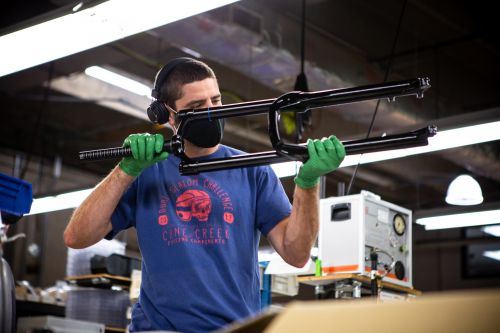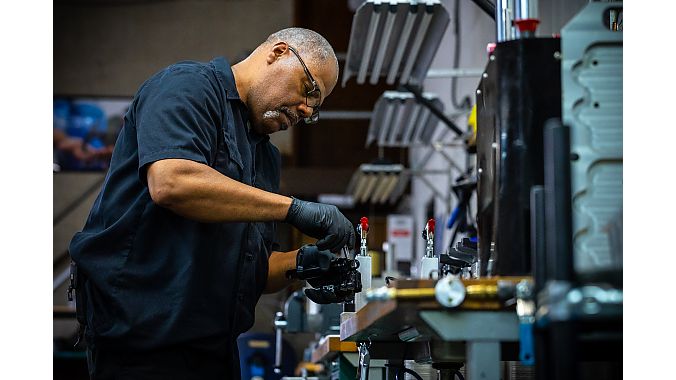A version of this article ran in the August issue of Bicycle Retailer & Industry News.
FLETCHER, N.C. (BRAIN) — It's the kind of failure that can ruin a company, but for Cane Creek Components, its Double Barrel Inline rear shock debacle nearly 10 years ago led to a gradual reawakening of the brand.
Call it a pivot point in its history.
"That wasn't our best moment," said Peter Gilbert, distributor sales manager, who was at Cane Creek during the fallout from the defective shock design.
In 2014, Cane Creek sold the shock to Specialized and other bike brands' bikes, a triumphant moment in the company's history. A year later, the shocks were beset with problems and returns mounted, resulting in a loss of OEM business and overall customer trust.
"By 2016, the self-inflicted damage put us on the verge of bankruptcy," said CEO and President Brent Graves, who came to the brand that year. "Fortunately, we were able to identify, understand, and address those mistakes pretty quickly. The No. 1 mistake was putting all of our eggs in one basket, then dropping the basket, and jumping up and down on the eggs."
Graves said the manufacturer had focused on rear shocks at the expense of other components.
"So we immediately started development of new products — we got back into brakes, got into cranks, finally got the (Helm) fork to market, introduced new headsets, new posts, bottom brackets, and so on," Graves said. "We also formally recognized that Cane Creek is a product company, and our success is dependent on regularly introducing new product. Within two years, our product introductions were up nearly threefold."
Doubling down on product innovation
That set the course for Cane Creek, now buoyed by the bike boom but no longer looking to make the big OEM splash. Instead, it has averaged more than one new product per month for the past five years.
"We're doing a far better job than before on focusing on what's going to benefit the rider," said Brand Manager Sam Anderson. "And sometimes the cost has to go up, but we know those types of customers are out there. I'd give Brent a good chunk of responsibility for that. He is a product guy. And we are a product-developing company."
Cane Creek joined with independent product designer Craig Edwards to create the eeBrake rim brake. This led to a range of ee-branded components, including lighter versions of the brand's signature product, the Thudbuster seatpost. The Thudbuster ST and LT models represent about 40% of Cane Creek's business, Anderson said, with a healthy OEM demand in Germany for use on e-bikes.
"We get to do the forks and shocks because of the Thudbuster," Anderson said.
The eeSilk+ gravel (up to 35mm compliance) and eeSilk all-road (20mm) seatposts led to the eeSilk Stem for gravel, with up to 20mm compliance and a lockout knob. The stem launched at Unbound Gravel in June.
"We sold the shit out of it (at Unbound), pardon my language," Anderson said.
Innovations like the eeSilk Stem are made easier with the recent expansion of Cane Creek's longtime facility, located about 25 minutes south of Asheville. Originally Dia-Compe's U.S. headquarters beginning in 1973, the company became Cane Creek Cycling Components in 1996 and added a R&D and engineering wing in 2015, including a test lab.
Cane Creek hand builds all of its suspension and eeBrake products in its 28,872-square-foot Fletcher facility, with the rest of its components manufactured in Taiwan. Its parts storage area holds 3,500 SKUs. U.S. IBDs purchase through QBP, BTI, and JBI and the company has international distributors as well.
Anderson said another key development was outsourcing headset manufacturing to Taiwan. "We didn't feel we were necessarily adding value," he said. "People were buying parts made in Taiwan instead. And so our cost was way too high, and we figured we're going to sell the same amount or more by lowering the price. It also allowed us to use our machines to make new things, quantify them — like the eeSilk Stem prototype — just to see if it works, and then we can spend and go."
Cane Creek is seeing a slow down in domestic business relative to European sales, with about 30% of its current sales in the U.S. Normally U.S. sales were 37-40% of its business, said Gilbert.
"The United States is very moment- and fashion-driven," he said. "Whereas in Europe, they're still riding bikes to school; they're still riding their bikes to the market."
'Do what it takes'
Cane Creek reports year-over-year revenue increased 30% from 2019 to 2020, and 43% from 2020 to 2021. In 2019, the brand had 41 full-time employees; today it has 57.
Graves said Cane Creek's "do what it takes" mindset was critical during the early days of the pandemic.
"Every challenge turned into an opportunity for us to prove to ourselves that we could adapt, pivot, and move forward," Graves said. "We've done it so many times, that by the time the pandemic rolled in — remember at first in April 2020 it looked very ominous for the bike industry — we just took it in stride. It was and is a testament to the awesome group of people we have here."
While Cane Creek has been employee-owned since the '90s, it recently began offering a profit sharing program, with at least 25% of the company's annual net income to be shared equally among eligible employees as long as certain guidelines are met.
The boom boosted Cane Creek sales in headsets, notably the ViscoSets, which offer steerer damping for e-bikes and cargo bikes. Riese & Mueller is a key OEM customer, particularly for seatposts and ViscoSets.
Cane Creek also provides OE components and suspension to smaller and boutique brands like Ibis, Yeti, Santa Cruz, and Cotic from the UK.
"Will our suspension products dislodge RockShox or Fox in the big picture in 2023? The answer is no," Gilbert said. "We will be good with partners like Cotic bikes ... Smaller guy. He supports us, we support him. Ibis. These are the guys you want to be partners with. These guys are good customers for us."
Getting and retaining those customers comes down to rebuilding trust after the Inline shock misstep.
"There are ways to rebuild trust that people might think are good ideas," Gilbert said. "Let's buy everybody off. 'We're going to give you $200 bucks off of your next purchase of a shock because this one wasn't any good.' That's a temporary fix. You earn the business or you buy it. And I think we've been pretty good at sticking to earning it.
"Who are we? What do we want to be when we grow up? And at some point you're going, 'Do we want to be a prime vendor supplier to Trek, Specialized, Giant?' Yeah, that's great money coming into the door. But is it profitable? Is it stressful? Is it good for the company? Would we rather do business with Santa Cruz, Ibis, and Yeti? Yes."




